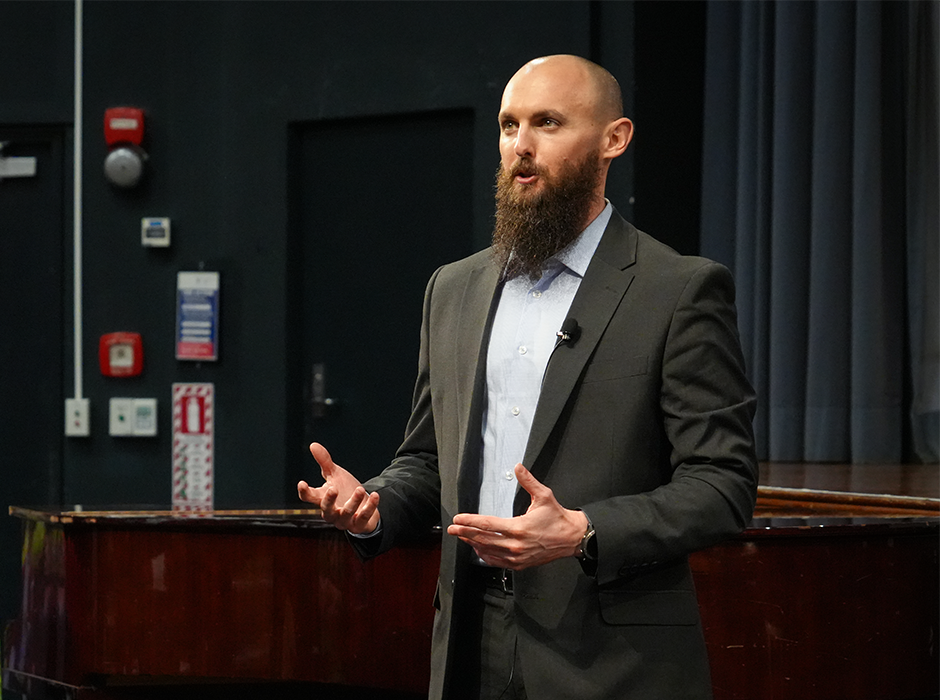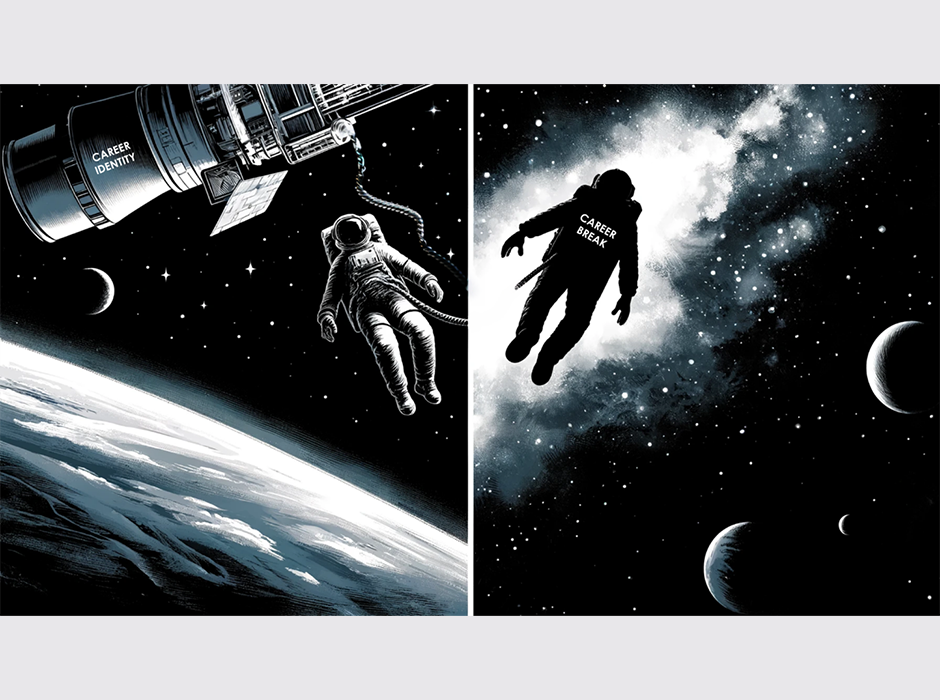
Doctoral candidate Patrick Mazzocco was the winner of Otago's Three Minute Thesis Grand Final recently.
Otago’s Three Minute Thesis (3MT®) Grand Final was held recently. Five doctoral candidates and three master’s candidates each had three minutes to communicate their research to a non-specialist audience, with the help of one static slide. Communications adviser Koren Allpress spoke with the doctoral winner Patrick Mazzocco about his research and presentation.
For some people, it may well have been the ‘worst year of their life’, but it seems they are still in favour of the concept of a career break.
Doctoral candidate Patrick Mazzocco won Otago’s 3MT® grand final competition recently with his speech ‘The Career Break Paradox’. Patrick, who is halfway through his PhD with the Higher Education Development Centre, says for many people the idea of taking a break from their careers is terrifying.
He interviewed 24 people from eight countries and received survey results from a further 214 people. Participants had varying levels of education – high school to tertiary postgraduate, and they worked in a wide range of industries including sales, broadcasting, education, marketing, IT, medicine, social work and industrial design.
“Many of my participants described growing up never questioning their career trajectories. They were expected to go to a reputable university, get a degree, get a job, climb the ladder within that organisation, and then retire,” Patrick says.
“I had several participants describe being in their dream jobs, like the ones they wanted at 10 years old. They liked their co-workers, day-to-day tasks, and lifestyles those jobs provided. Who wouldn’t trade for that situation in a heartbeat?”
However, many felt discontent and anxious about their confined life paths and having to continue climbing the corporate ladder.
Patrick was surprised by people’s motives for pursuing a career break – while burnout, job insecurity and/or work-life imbalance were mentioned regularly as expected, he was shocked to hear every participant raise the concept of identity.
“I anticipated the concept of identity would come up during the interviews, but it was astonishing to hear these people from very different backgrounds, who pursued career breaks for very different reasons repeatedly say things like ‘I didn’t know who I was anymore without my career’, ’I felt like I no longer had a place in society’, and ‘all of my self-worth came from my job’.
“So, they took career breaks, and grappled with the question of ‘Who am I without my career?’ which, I think, many people are afraid to ask themselves because they might not like the answer.”
Patrick wants to make it clear that these breaks weren’t all “cinematic adventures”.
“In fact, some said it was the worst year of their life.”
Regardless of what they did during their break, Patrick says everyone used the same language to describe how the experience changed them and how they think about their careers. They came out the other side with a more secure sense of self that allows them to say ‘I could lose my job tomorrow, and that doesn’t scare me because I know I’ll be okay. I know who I am, and that’s enough’.
Patrick has taken a few career breaks of his own and says each one was “rewarding and challenging”.
“At the time I thought they would simply satiate my wanderlust cravings and allow me to settle into a move conventional life without regrets.”
Unfortunately, that contentment never came. It wasn’t until he “fell unexpectedly” into career counselling that he realised the value of those career breaks.
The informal lessons and learning experiences he got from his career breaks allowed him to better understand, relate with and support others. When he was considering his thesis topic he wondered if identity development was as crucial for other career break pursuers.
Career breaks are becoming more commonly discussed and pursued. Simultaneously, the age of retirement is being extended globally.
“Generations Y and Z will have to work later into life than previous generations, and they’re also struggling to save for this period of reprieve that seems so far away.
“And yet, there’s not much research on the topic [of career breaks].”
Patrick experienced “disbelief” upon hearing he had won the Otago 3MT® final.
“I simply wanted to represent myself, my supervisors, my department, and my participants well.”
His next step entails submitting a video recording of his presentation for international consideration in the Asia-Pacific 3MT® and Matariki 3MT® competitions.
There will be a public voting component at the next stage, so hopefully the campus community can carry this success a bit further, he says.
Patrick wants to thank the people who participated in his research.
“They were all incredibly candid, authentic, and thoughtful during our interviews I was very fortunate to have such a wonderful group of people share their stories and deepest thoughts with me.”

Patrick got the idea for his his slide after listening to his interviewees describe how alone they felt during their career break. A fan of sci-fi, he thought it would be fitting to depict this feeling as an astronaut attached to a space craft with the words 'career identity' on it, and then the astronaut adrift with the words 'career break' written on them.
A big fan of sci-fi, Patrick says his favourite show is The Expanse which is set well into the future in space.
“As I was listening to my participants describe how alone and scared they felt during their career breaks, I thought about how characters in that show feel the same way when they’re adrift in space, hoping for something to cling to.”
The spaceships provide the show’s characters security, sustenance, purpose and comradery, many of the things Patrick’s participants say they missed during their career breaks. “It’s the source of their career identities.”
Patrick wrote several paragraphs describing this metaphor and fed it into Dall-E 3. He spent some time refining his prompts until getting the image he was after, which he then further tweaked in Canva.
“It’s been interesting, though, because it seems to generate very divisive responses. I’ve been told it’s a wonderful metaphor and beautiful image by some, and that it’s upsetting or confusing by others.”
Patrick says these responses align well with the entire concept of career break, which is confronting.
“I say as much in my 3MT® speech: Career breaks are adversarial to society’s standards of success.”
He believes some people will see his research and feel vindicated, while others will hopefully develop a better understanding and appreciation for those who took such a courageous risk in detaching from their career identities.
Otago’s 3MT® Grand Final results:
Best Doctoral Presentation – Patrick Mazzocco, High Education Development Centre
Doctoral Runner-up Presentation – Ben Topham, Population Health (Christchurch)
Best Master’s Presentation – Briar Mills, Human Nutrition
People’s Choice Winner – Arung Gihna Mayapada, Accountancy and Finance
Otago’s Grand Final doctoral finalists:
Jai Yap, Medicine
Tawfique M Rahman, Geography
Otago’s Grand Final master’s finalists:
Tandia Gooch, Physiology
Charlotte Harrison, Population Health (Christchurch)







